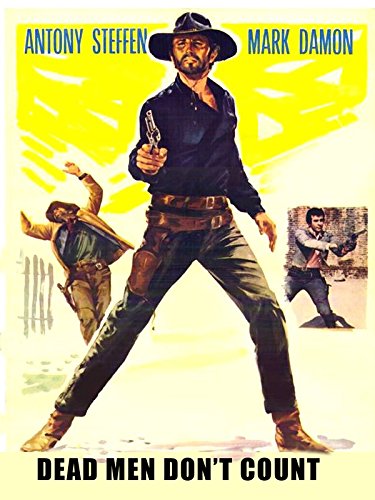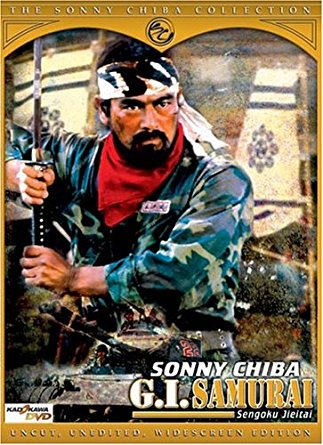 Dead Men Don’t Count (1968) – Spaghetti-western fixtures Anthony Steffen and Mark Damon star as bounty hunters who get involved in the string of murders occurring in a town run by a corrupt sheriff under the thumb of the “respectable” rich guy who wants all the land for himself because he knows the railroad is coming. Meanwhile, Mrs. Rich Guy wonders if, because of the pistol he carries, Mark Damon’s character is the baby she gave up twenty years ago when she helped Mr. Rich Guy kill her then-husband because she was in lurve.
Dead Men Don’t Count (1968) – Spaghetti-western fixtures Anthony Steffen and Mark Damon star as bounty hunters who get involved in the string of murders occurring in a town run by a corrupt sheriff under the thumb of the “respectable” rich guy who wants all the land for himself because he knows the railroad is coming. Meanwhile, Mrs. Rich Guy wonders if, because of the pistol he carries, Mark Damon’s character is the baby she gave up twenty years ago when she helped Mr. Rich Guy kill her then-husband because she was in lurve.
Nothing remarkable about this one, but it’s a fun watch with no major problems. The fact that the Mr. Rich Guy is named “Steve Rogers” just clawed at my brain every time they said it, though.
 G.I. Samurai (1979) – Three different units (squads? clumps?) of Japanese Self-Defense Forces — a tank-and-jeep, a boat, and a helicopter — find themselves inexplicably transported four hundred years back in time, into the “warring states” era. Fortunately, their ranking officer, Lt. Iba, is played by Sonny Chiba, who’s pretty much a samurai himself. Thanks to the Resident Nerd among the soldiers, their plan becomes one of changing the past as much as possible, so that whatever force brought them here will have an “aftershock” and pull them back. (You don’t see THAT in most time travel movies.)
G.I. Samurai (1979) – Three different units (squads? clumps?) of Japanese Self-Defense Forces — a tank-and-jeep, a boat, and a helicopter — find themselves inexplicably transported four hundred years back in time, into the “warring states” era. Fortunately, their ranking officer, Lt. Iba, is played by Sonny Chiba, who’s pretty much a samurai himself. Thanks to the Resident Nerd among the soldiers, their plan becomes one of changing the past as much as possible, so that whatever force brought them here will have an “aftershock” and pull them back. (You don’t see THAT in most time travel movies.)
Of course, American viewers suffer by not having the background in Japanese history that would fill in all the unspoken lacunae, but the movie’s got a few problems of its own: there’s a long but ultimately pointless subplot about a trio of soldiers stealing the boat and becoming rape-and-pillage pirates until Iba brings them down, the soldiers act as if their fuel and ammo are limitless until the battle where everything runs out, and there are some insanely bad music choices throughout. That said, there are huge, full-scale battles that show that a bazillion archers and swordsmen can hold their own against modern armaments through sheer force of numbers.
 Kill, Baby… Kill! (1966) – The English title makes it sound like a ’70s-era giallo or slasher flick. On the other hand, its original Italian title, Operazione paura (literally “Operation Fear”) makes it sound like a euro-spy thriller. In reality, its a historical ghost yarn of a piece with the horror movies that Hammer was making during the same decade, complete with a vaguely German rural setting and an academic man of science who initially scoffs at the peasants’ superstition but finds that the uncanny phenomena around him are more than his ever-so-modern rationality can explain. Director Mario Bava uses the swaths of color and the slow camera movements that are his trademarks, and they almost make up for some plot holes the size of Bavaria and dialog that, at least in the English dub, raises more questions than it answers.
Kill, Baby… Kill! (1966) – The English title makes it sound like a ’70s-era giallo or slasher flick. On the other hand, its original Italian title, Operazione paura (literally “Operation Fear”) makes it sound like a euro-spy thriller. In reality, its a historical ghost yarn of a piece with the horror movies that Hammer was making during the same decade, complete with a vaguely German rural setting and an academic man of science who initially scoffs at the peasants’ superstition but finds that the uncanny phenomena around him are more than his ever-so-modern rationality can explain. Director Mario Bava uses the swaths of color and the slow camera movements that are his trademarks, and they almost make up for some plot holes the size of Bavaria and dialog that, at least in the English dub, raises more questions than it answers.